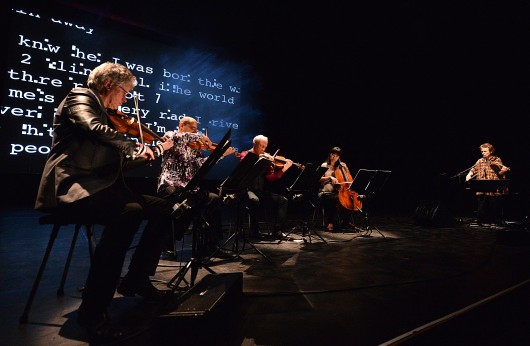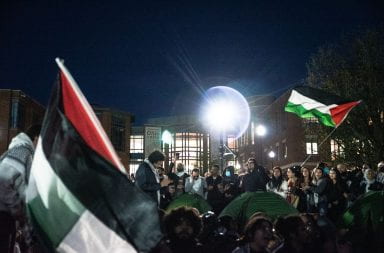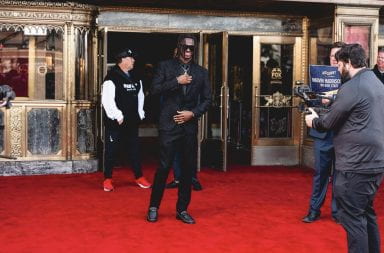
The Kronos Quartet and Laurie Anderson perform ‘Landfall’ on June 28, 2013 at Barbican Centre in London.
Credit: Photo by Mark Allan
“A spaceship that crash-landed on the prairie.”
It was a metaphor Wexner Center for the Arts director Sherri Geldin used to describe her arts center when introducing a Saturday night concert.
It’s also a good descriptor for the strange ethereal performance that followed her remarks.
Laurie Anderson and Kronos Quartet took to the stage at Mershon Auditorium for “Landfall,” a collaboration of string arrangements, visuals and spoken word.
Anderson, a performance artist and composer, and the quartet first met during the Wex’s dedication 25 years ago. “Landfall,” however, was their first work together.
From the onset, it was clear this would be no quaint display of chamber music. It was jarring and wild, which is no surprise considering Anderson’s inspiration for the work came in part from Hurricane Sandy’s 2012 arrival in New York.
And the “songs” they played could have fit well as the soundtrack to a disaster movie or a psychological thriller. Musically, it was a lot like the symphonic crescendo in the Beatles’ “A Day in the Life,” except that it lasted for more than an hour.
More than creating music, the group struck up a tone with their instruments. More often than not, it was a controlled chaos that intensified and relaxed throughout the course of the roughly 70-minute performance. Like Hurricane Sandy, the performance was like a storm with little pockets of calm.
The poetry from Anderson was even more esoteric. During the quieter moments, she would whisper thoughts and stories into the microphone — sometimes nostalgic, but always mysterious. A screen behind the performance subtly matched the music with colors or intermittent displays of scrolling words — with varying amounts of the text replaced by Wingdings-esque symbols, it was sometimes legible, sometimes not.
A show so strange was hard to digest and even harder to critique. It was like watching a symphony through a thick layer of LSD.
Anderson’s delivery of the spoken word elements was flamboyant yet reflective. It was such an unnatural way of talking that it was frustrating at first, but finally hypnotizing once I had given in to it.
At the beginning, I was working to decipher what was before me. I tried to rationalize the irrational, and trying to experience it cerebrally was frustrating.
Eventually I gave in, listening and watching it passively like a dream I couldn’t understand but was fully enthralled by.
I imagine it was a loss of control each audience member would have to accept if they wanted to get anything from this.
With general admission tickets between $32 and $45, it was either a courageous or cocky decision for the Wex to make this a marquee event in a 2,500-seat auditorium.
Perhaps a little disappointing, too, was that the chaos never evolved into something purely “pleasant” sounding.
Almost entirely devoid of melodies, there was nothing crowd-pleasing about the music, and I imagine a lot of the audience left thinking “huh, well, that was … interesting.”
And if the music could be frustrating, it was at least always interesting, and that’s a credit to the technical skill of the five string players.
They didn’t break out into melodies, but their bows scrapped across the strings in ever-curious ways. The sounds weren’t pretty, but they were almost always fantastically tenacious. The musicians were as versatile with their instruments as Linus is with a blanket.
Ultimately, if you were able to sit back and let the concert happen to you, it was a wild experience. I left the building with a different mindset and in a different mood — scrutinizing little details on the walk home through the entropic trance the concert put me in. This was a show that stayed with you.
I remember a friend describing art to me once as “depicting things as something they aren’t.” If that’s a decent definition and my experience was shared by others, the merits of “Landfall” were sky-high.


